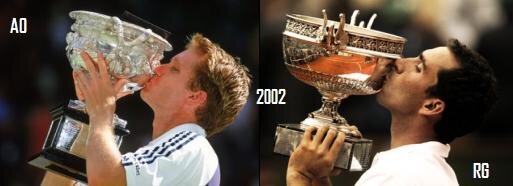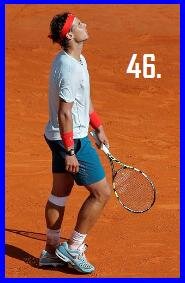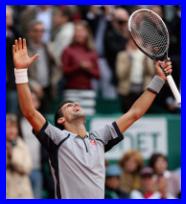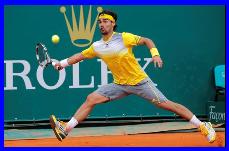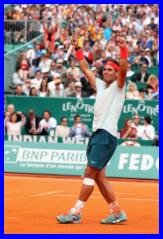My eBook
Categories
-
Recent Posts
Rome – semifinals
2nd semifinal:
Match stats (total points: 78-70):
1st semifinal:
Match stats (total points: 57-36):
Rome – three rounds + QFs
Quarterfinals
Tomas Berdych had lost 11 straight matches to Novak Djokovic, so when the Serb led 6-2 5:2 in their Rome quarterfinal, Berdych’s victory was actually beyond imagination. Yet this year, the Czech comes back from similarly difficult situations more often than anyone #. In the 9th game 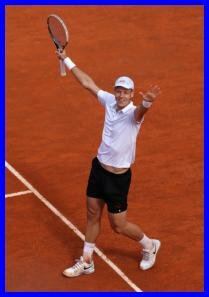 Djokovic was serving at 30/15 being two points away from the semifinal, but Berdych responded with three points won in a row and the match turned magically around. A break for Berdych in the 3rd game of the 3rd set was decisive, but serving for the match, Berdych choked a bit allowing his opponent to save a triple match point. At ‘deuce’ Berdych extended his service preparation, delivered a service winner followed by an ace, 2-6 7-5 6-4. “One day you have to break [the run] and I am happy that it was today,” said Berdych. “It was a great game and I am happy. I was trying to stay positive from the beginning. He didn’t give me a single chance. I was trying to stay there and there are matches when you don’t get a single chance, but then if you get one, then you are ready. Then everything could turn the other way and this is what happened.” Last week in Madrid, Rafael Nadal needed 2 hours 27 minutes to beat his compatriot David Ferrer, this time their encounter lasted 20 minutes longer, but Nadal wasn’t in serious danger like seven days before, notching a 6-4 4-6 6-2 victory that impreoves his H2H record vs. Ferrer to 19-4 – one of the most lopsided H2Hs in the Open era. Roger Federer saved a set point on return during his 6-4 7-6(2) win over Jerzy Janowicz and next meets Benoit Paire, a guy who is completely unexpected in a semifinal of such a big tournament. The 24-year-old Frenchman dismissed Marcel Granollers 6-1 6-0 in just 57 minutes in the first quarterfinal of the day (they’d played twice before at the main level, and both matches in straight sets won the Spaniard). Thanks to his amazing run in Rome, Paire will be seeded for the first time in a Grand Slam tournament at Roland Garros.
Djokovic was serving at 30/15 being two points away from the semifinal, but Berdych responded with three points won in a row and the match turned magically around. A break for Berdych in the 3rd game of the 3rd set was decisive, but serving for the match, Berdych choked a bit allowing his opponent to save a triple match point. At ‘deuce’ Berdych extended his service preparation, delivered a service winner followed by an ace, 2-6 7-5 6-4. “One day you have to break [the run] and I am happy that it was today,” said Berdych. “It was a great game and I am happy. I was trying to stay positive from the beginning. He didn’t give me a single chance. I was trying to stay there and there are matches when you don’t get a single chance, but then if you get one, then you are ready. Then everything could turn the other way and this is what happened.” Last week in Madrid, Rafael Nadal needed 2 hours 27 minutes to beat his compatriot David Ferrer, this time their encounter lasted 20 minutes longer, but Nadal wasn’t in serious danger like seven days before, notching a 6-4 4-6 6-2 victory that impreoves his H2H record vs. Ferrer to 19-4 – one of the most lopsided H2Hs in the Open era. Roger Federer saved a set point on return during his 6-4 7-6(2) win over Jerzy Janowicz and next meets Benoit Paire, a guy who is completely unexpected in a semifinal of such a big tournament. The 24-year-old Frenchman dismissed Marcel Granollers 6-1 6-0 in just 57 minutes in the first quarterfinal of the day (they’d played twice before at the main level, and both matches in straight sets won the Spaniard). Thanks to his amazing run in Rome, Paire will be seeded for the first time in a Grand Slam tournament at Roland Garros.
Three Rounds
A bit stronger line-up in Rome than last week in Madrid because Juan Martin del Potro entered the tournament after three weeks off. The Tandil Tower met fellow Argentine, the new Pope  Francis. It didn’t help Del Potro – he was unexpectedly ousted in the third round by Benoit Paire [36], who had saved a match point in the second round (against Julien Benneteau) reaching quarterfinals of a Masters 1000 even for the first time in career. Marcel Granollers [37] became the second unheralded quarter-finalist, however, the Spaniard made this stage in Masters 1000 last year at the Canadian Open. The Spaniard was doing everything to slip away his chance to beat Andy Murray in the second round. After winning 1st set 6-3, Granollers led 4:1 in the 2nd set with a double break and *5:4 in the tie-break. The Scot (celebrated 26th birthday that day) leveled at one set apiece, but retired immediately after taking the tie-break due to back pain: “I pulled out because there is a good chance I wouldn’t be playing tomorrow. We’ll have to wait for Paris. I’d be very surprised if I were playing in Paris.” Seven year ago Murray defeated Granollers in Barcelona being a set and 1:4 down in the 2nd set (4-6, 6-4, 6-2). In the third round Granollers struggled past Jeremy Chardy, a man whom had also defeated reaching his previous big quarterfinal (Toronto ’12). Qualifier Ernests Gulbis displayed an awesome tennis in the 1st set of his third round match against Rafael Nadal. The Latvian (in the first round snapped Jarkko Nieminen‘s 9 tie-break winning streak) was a point away from bagelling the King of Clay! Nadal survived a break point at the beginning of the 2nd set and his patience paid off in the end. Gulbis was producing fantastic winners off both sides throughout, twice came back from a break down in losing sets, but when they stuck at two games from taking sets Nos. 2 & 3, Nadal’s experience and enormous fighting spirit prevailed. The final scoreline: 1-6 7-5 6-4; Nadal’s improved H2H vs.
Francis. It didn’t help Del Potro – he was unexpectedly ousted in the third round by Benoit Paire [36], who had saved a match point in the second round (against Julien Benneteau) reaching quarterfinals of a Masters 1000 even for the first time in career. Marcel Granollers [37] became the second unheralded quarter-finalist, however, the Spaniard made this stage in Masters 1000 last year at the Canadian Open. The Spaniard was doing everything to slip away his chance to beat Andy Murray in the second round. After winning 1st set 6-3, Granollers led 4:1 in the 2nd set with a double break and *5:4 in the tie-break. The Scot (celebrated 26th birthday that day) leveled at one set apiece, but retired immediately after taking the tie-break due to back pain: “I pulled out because there is a good chance I wouldn’t be playing tomorrow. We’ll have to wait for Paris. I’d be very surprised if I were playing in Paris.” Seven year ago Murray defeated Granollers in Barcelona being a set and 1:4 down in the 2nd set (4-6, 6-4, 6-2). In the third round Granollers struggled past Jeremy Chardy, a man whom had also defeated reaching his previous big quarterfinal (Toronto ’12). Qualifier Ernests Gulbis displayed an awesome tennis in the 1st set of his third round match against Rafael Nadal. The Latvian (in the first round snapped Jarkko Nieminen‘s 9 tie-break winning streak) was a point away from bagelling the King of Clay! Nadal survived a break point at the beginning of the 2nd set and his patience paid off in the end. Gulbis was producing fantastic winners off both sides throughout, twice came back from a break down in losing sets, but when they stuck at two games from taking sets Nos. 2 & 3, Nadal’s experience and enormous fighting spirit prevailed. The final scoreline: 1-6 7-5 6-4; Nadal’s improved H2H vs.  Gulbis to 6-0, but in five matches lost a set being four times quite close to lose another one, twice in Rome (previously in the 2010 semifinal). “I thought I was the better player in the match and also in the second and third sets but he is the champion,” said Gulbis. “I lost against him in Indian Wells when I also thought I played better than him. He is solid and he didn’t do anything special and I made mistakes and so he won.” Roger Federer showed up with a new haircut – his shortest in the XXI Century and very strong performances in two opening matches. In the quarterfinal he’ll face for the first time Jerzy Janowicz, who rediscovered his magic from Paris Bercy where he stunned the tennis world advancing to the final out of nowhere. The young Pole in two entertaining battles sent two Top 10 Frenchmen packing (Tsonga & Gasquet). Janowicz [24] ripped off his shirt in celebration after defeating Tsonga. Tomas Berdych for the fourth time this year ousted Kevin Anderson – they have met eight times in the last 18 months with Berdych as a winner every time.
Gulbis to 6-0, but in five matches lost a set being four times quite close to lose another one, twice in Rome (previously in the 2010 semifinal). “I thought I was the better player in the match and also in the second and third sets but he is the champion,” said Gulbis. “I lost against him in Indian Wells when I also thought I played better than him. He is solid and he didn’t do anything special and I made mistakes and so he won.” Roger Federer showed up with a new haircut – his shortest in the XXI Century and very strong performances in two opening matches. In the quarterfinal he’ll face for the first time Jerzy Janowicz, who rediscovered his magic from Paris Bercy where he stunned the tennis world advancing to the final out of nowhere. The young Pole in two entertaining battles sent two Top 10 Frenchmen packing (Tsonga & Gasquet). Janowicz [24] ripped off his shirt in celebration after defeating Tsonga. Tomas Berdych for the fourth time this year ousted Kevin Anderson – they have met eight times in the last 18 months with Berdych as a winner every time.
# Berdych’s five wins in 2013 being a few points from a straight sets loss:
Dubai: Roger Federer 3-6, 7-6(8), 6-4 – 3 mp
Miami: Daniel Gimeno-Traver 5-7, 7-6(3), 6-2
Miami: Alejandro Falla 2-6, 7-6(6), 6-4 – 2 mp
Barcelona: Nikolay Davydenko 3-6, 7-5, 6-4 – 2 mp
Rome: Novak Djokovic 2-6, 7-5, 6-4
19th week – Madrid
I haven’t described this tournament as past ‘Masters 1000’ events this year, because I had a busy weekend (partying with friends from Breslau), and simply hadn’t time to watch any matches from quarterfinals and onwards.
 There was a big surprise in the second round: in the longest ‘best-of-three’ match of the season (3 hours 6 minutes), Grigor Dimitrov notched his first win over a Big 4 player stunning Novak Djokovic 7-6(6) 6-7(8) 6-3. The young Bulgarian saved three set points in the 1st set, but wasted a match point in the 2nd set suffering cramps in the meantime. It had seemed he should have lost the decider quickly, but somehow regrouped and survived being supported strongly by the Madrid crowd, who booed the Serb when he left the court (it’s tough to indicate one special reason of that). “Of course this has been what I’ve been working for, to play matches like that, and why not win them?” Dimitrov said. “Today was one of these days that I felt good on court. I felt I had enough hours of practice in the weeks before. I felt that I could actually hang with Novak the whole match. That’s the whole purpose of getting ready for big events and eventually for big matches.” Other surprise, but of much more smaller caliber came from Kei Nishikori‘s hands. The Japanese ousted Roger Federer 6-4 1-6 6-2 in the third round. “Credit to Kei. He got it done and was more solid in the wind. He played better than I did, so the better guy won today, that’s for sure.” said the
There was a big surprise in the second round: in the longest ‘best-of-three’ match of the season (3 hours 6 minutes), Grigor Dimitrov notched his first win over a Big 4 player stunning Novak Djokovic 7-6(6) 6-7(8) 6-3. The young Bulgarian saved three set points in the 1st set, but wasted a match point in the 2nd set suffering cramps in the meantime. It had seemed he should have lost the decider quickly, but somehow regrouped and survived being supported strongly by the Madrid crowd, who booed the Serb when he left the court (it’s tough to indicate one special reason of that). “Of course this has been what I’ve been working for, to play matches like that, and why not win them?” Dimitrov said. “Today was one of these days that I felt good on court. I felt I had enough hours of practice in the weeks before. I felt that I could actually hang with Novak the whole match. That’s the whole purpose of getting ready for big events and eventually for big matches.” Other surprise, but of much more smaller caliber came from Kei Nishikori‘s hands. The Japanese ousted Roger Federer 6-4 1-6 6-2 in the third round. “Credit to Kei. He got it done and was more solid in the wind. He played better than I did, so the better guy won today, that’s for sure.” said the 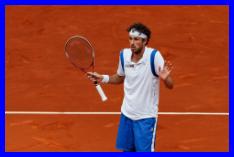 Swiss playing his first clay-court tournament this year. Robin Haase has become an infamous record holder of the longest tie-break losing streak. The Dutchman suffered three tie-break defeats this week which has extended his streak to 17 (the previous longest losing streak belonged to Graham Stilwell, who lost 15 tie-breaks in a row in years 1972-73) # The Dutchman can’t win a main-tour level tie-break since Zagreb ’12, however, in the meantime he won a few in qualifying rounds and a Challenger. The best tournament of career experienced Pablo Andujar [113]. The 27-year-old Spaniard came to Madrid having lost 11 consecutive matches lately, yet during the Mutua Madrid Open he won four matches, reaching first Masters 1000 semifinal. Arguably it was the best tournament for Stanislas Wawrinka as well. The Swiss gained his second Masters 1000 final, the previous one (Rome 2008) was a bit less demanding, because he got a quick retirement in the semifinal. This time the semifinal was very tough, he had been trailing *2:4 (15/40) in the 3rd set against Tomas Berdych, before won it 6-3 4-6 6-4. Wawrinka returns to the Top 10 for the first time since October 2008. “I’m very happy,” said Nadal after his final win over Wawrinka. “I think I played a really good match. I think I played the best match of the whole week today in the final. Being able to play here in Madrid and being able to win in front of all my people, is something really special.” The 26-year-old Mallorcan
Swiss playing his first clay-court tournament this year. Robin Haase has become an infamous record holder of the longest tie-break losing streak. The Dutchman suffered three tie-break defeats this week which has extended his streak to 17 (the previous longest losing streak belonged to Graham Stilwell, who lost 15 tie-breaks in a row in years 1972-73) # The Dutchman can’t win a main-tour level tie-break since Zagreb ’12, however, in the meantime he won a few in qualifying rounds and a Challenger. The best tournament of career experienced Pablo Andujar [113]. The 27-year-old Spaniard came to Madrid having lost 11 consecutive matches lately, yet during the Mutua Madrid Open he won four matches, reaching first Masters 1000 semifinal. Arguably it was the best tournament for Stanislas Wawrinka as well. The Swiss gained his second Masters 1000 final, the previous one (Rome 2008) was a bit less demanding, because he got a quick retirement in the semifinal. This time the semifinal was very tough, he had been trailing *2:4 (15/40) in the 3rd set against Tomas Berdych, before won it 6-3 4-6 6-4. Wawrinka returns to the Top 10 for the first time since October 2008. “I’m very happy,” said Nadal after his final win over Wawrinka. “I think I played a really good match. I think I played the best match of the whole week today in the final. Being able to play here in Madrid and being able to win in front of all my people, is something really special.” The 26-year-old Mallorcan  barely escaped in the quarterfinals when he was two points away against his most frequent rival on clay, David Ferrer. The older Spaniard had a comfortable position to finish a point with a forehand which could give him a double match point, instead he was lobbed, Nadal finished the point with a smash and never looked back with a 4-6 7-6(3) 6-0 victory. Nadal joins Thomas Muster in the Open era with 40 clay-court titles (55 titles altogether). He is 40-6 overall in clay finals, now only trails fellow left-hander Guillermo Vilas (46). Stats of the final
barely escaped in the quarterfinals when he was two points away against his most frequent rival on clay, David Ferrer. The older Spaniard had a comfortable position to finish a point with a forehand which could give him a double match point, instead he was lobbed, Nadal finished the point with a smash and never looked back with a 4-6 7-6(3) 6-0 victory. Nadal joins Thomas Muster in the Open era with 40 clay-court titles (55 titles altogether). He is 40-6 overall in clay finals, now only trails fellow left-hander Guillermo Vilas (46). Stats of the final
Finals
S: (5)Rafael Nadal d. (15)Stanislas Wawrinka 6-2, 6-4
D: (1)B.Bryan/M.Bryan d. (7)A.Peya/B.Soares 6-2, 6-3
# Robin Haase’s 17 lost tie-breaks in a row (new record):
2012
Indian Wells: Pablo Andujar 2-6, 6-3, 6-7(2)
Miami: Jurgen Melzer 6-7(2), 6-3, 4-6
Nice: Juan Carlos Ferrero 6-4, 6-7(6), 6-7(6)
Roland Garros: Mikhail Youzhny 3-6, 6-7(5), 4-6
s-Hertogenbosch: Mate Pavic 4-6, 6-7(2)
Wimbledon: Juan Martin del Potro 4-6, 6-3, 6-7(3), 5-7
Kitzbuhel: Philipp Kohlschreiber 6-7(2), 6-3, 6-2
Davis Cup: Stanislas Wawrinka 3-6, 6-3, 3-6, 6-7(4)
Bangkok: Hiroki Moriya 6-2, 6-7(6), 3-6
2013
Zagreb: Jurgen Melzer 6-7(2), 3-6
Miami: David Goffin 6-7(4), 6-3, 1-6
Casablanca: Kenny De Schepper 6-2, 6-7(2), 6-3
Barcelona: Pablo Carreno Busta 1-6, 6-2, 6-7(5)
Madrid: Alexandr Dolgopolov 6-3, 6-7(6), 6-2
Madrid: Jo-Wilfried Tsonga 6-7(5), 6-7(2)
18th week
This gallery contains 2 photos.
Perhaps achievement of German football teams (Bayern Munchen & Borussia Dortmund advanced to the Champions League final) inspired German players in Munich: four made through to the quarterfinals, three of them to the semifinals – the most Germans in the … Continue reading
| Roland Garros 1991-1992 |
 Jim Courier finished only one year (1992) as the best player in the world, however, his reign in men’s tennis actually extended between Indian Wells ’91 and Wimbledon ’93, so more than two years. During those magnificent 27 months, he won the most Grand Slam (4 titles, twice Roland Garros & Australian Open) and ‘Masters 1000’ tournaments (5 titles, it was known as ‘Mercedes Super 9’ at the time), reaching major finals everywhere and contributing to the American triumph in Davis Cup. No-one before was able to hit ground-strokes with such an immense power and forward rotation as Courier in the early 90s. Courier’s amazing form peaked at Roland Garros ’92 when he was on a 25-match winning streak, overpowering all opponents with ease. It seemed that Centre Court in Paris would belong to him a decade, but it didn’t happen as Sergi Bruguera dethroned him in years 1993-94.
Jim Courier finished only one year (1992) as the best player in the world, however, his reign in men’s tennis actually extended between Indian Wells ’91 and Wimbledon ’93, so more than two years. During those magnificent 27 months, he won the most Grand Slam (4 titles, twice Roland Garros & Australian Open) and ‘Masters 1000’ tournaments (5 titles, it was known as ‘Mercedes Super 9’ at the time), reaching major finals everywhere and contributing to the American triumph in Davis Cup. No-one before was able to hit ground-strokes with such an immense power and forward rotation as Courier in the early 90s. Courier’s amazing form peaked at Roland Garros ’92 when he was on a 25-match winning streak, overpowering all opponents with ease. It seemed that Centre Court in Paris would belong to him a decade, but it didn’t happen as Sergi Bruguera dethroned him in years 1993-94.
Roland Garros 1990-91 Roland Garros 1992-93
^ In those years Courier compiled a 23-2 record in Paris ^
Posted in History
Leave a comment
| 2002: Australian Open + Roland Garros |
There are four Open era years (1976, 1998, 2002 & 2003) when two out of four Grand Slam crowns went to players who never won other major before or after. The 2002 year is special to some degree, it’s tough comparing that year to 1976 when Australian Open was negatively way beyond other three slams in terms of the prestige. A comparison to the years 1998 & 2003 also doesn’t make sense because maiden major titles in those years got really great players, the future Nos. 1 in the world… Thomas Johansson and Albert Costa stunned the tennis world in 2002, and there’s an analogy between these two players: both born in 1975 actually with the same height & weight throughout careers; before achieving the biggest successes they had never advanced past the Grand Slam quarterfinals, in 24 & 25 attempts respectively; even though their 2002 triumphs were surprising, they showed a couple of years earlier a distinctive potential capturing big titles – Johansson triumphed in Montreal ’99, Costa in Hamburg ’98; finally, both guys despite a negative doubles record (Johansson 76-98, Costa: 30-57) managed to get Olympic medals in doubles (Johansson silver in 2008, Costa bronze in 2000).
Australian Open 2002-03 Roland Garros 2002-03
I’ll be adding only French Opens to the end of May.
Posted in History
Leave a comment





